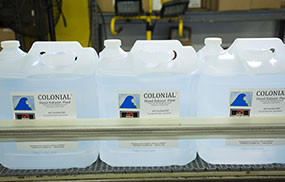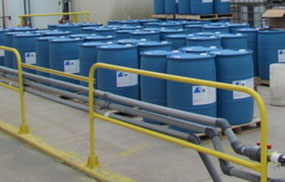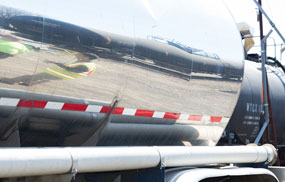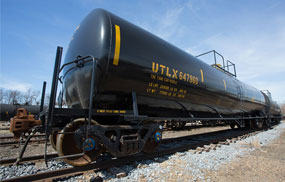Diesel Exhaust Fluid
Colonial Chemical Company has been a manufacturer and supplier of Urea based chemicals for NOx abatement for over 20 years. We produce and deliver millions of gallons of Diesel Exhaust Fluid (DEF) and urea in various forms annually. In 2010, new technology was introduced to meet lower NOx emission standards for diesel vehicles.
Diesel Exhaust Fluid was chosen as the consumable fluid that is key to new emission control systems designed to meet the new NOx standards.
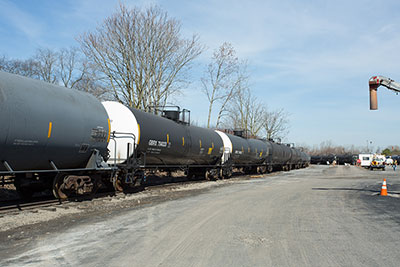 As a leader in the emerging Diesel Exhaust Fluid market, Colonial Chemical Company is an original Automotive-Alliance Stakeholder providing leadership and technical guidance to this new industry. We helped develop the current ISO 22241 global specifications that define quality as a US delegate. We are active in helping the industry to develop this new market and infrastructure. Colonial Chemical is recognized as a leader in technical expertise for this new product and urea chemistry in general. We helped develop the first commercial weights & measures bulk dispensing system and hold the first API Certification License.
As a leader in the emerging Diesel Exhaust Fluid market, Colonial Chemical Company is an original Automotive-Alliance Stakeholder providing leadership and technical guidance to this new industry. We helped develop the current ISO 22241 global specifications that define quality as a US delegate. We are active in helping the industry to develop this new market and infrastructure. Colonial Chemical is recognized as a leader in technical expertise for this new product and urea chemistry in general. We helped develop the first commercial weights & measures bulk dispensing system and hold the first API Certification License.
Colonial Chemical Company has been manufacturing DEF since 2005 and were selling DEF to several OEM’s, test fleets, and component manufactures prior to the market introduction of DEF in 2010. Currently, we continue to market our product to these groups and also sell to fuel/lubricant distributors, truck-stops, retail and fuel/convenience store marketers, larger fleets who operate in multiple regional locations, and into the agriculture, construction, and mining off-road markets. We have marine DEF products available.
Colonial Chemical offers our Colonial™ DEF product in small packages (1 & 2.5 gallon bottles), drums, and totes, as well as in bulk quantities. We also market our DEF under the Blue Wave™ DEF brand in the Southeastern states.
We have proven equipment solutions that we can recommend for many types of storage, handling, and dispensing applications. We have alliances with the leading DEF equipment providers and can offer discounted pricing for these systems. We understand that each customer application is unique and can combine this with guidance on the proper choices for systems that will assure trouble free operation and reliability.
Colonial Chemical Company is a small nimble company who is easy to work with and can bring you proven expertise in providing Colonial™ DEF Diesel Exhaust Fluid and dispensing solutions. We can work with you to offer private label opportunities, as small packaging is one of Colonial Chemical’s core competencies.
We are looking for distributors and partners who want to help us market our product. We can help our partners sell effectively and grow their business. We are ready to service the unique needs of customers. We can guide smaller users to a knowledgeable distributor partner in each region. Please use the Contact Us section or call us and we will respond promptly.
PRODUCT & SERVICE QUALITY
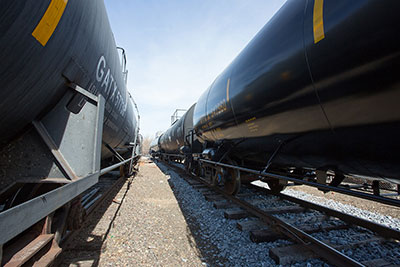 Colonial Chemical Company works to source our urea raw materials and products from only the most capable suppliers. Quality is a fundamental requirement for this critical fluid. In the DEF world, a quality incident can quickly create a myriad of problems that will inhibit a customer from running their operations and become a costly mess.
Colonial Chemical Company works to source our urea raw materials and products from only the most capable suppliers. Quality is a fundamental requirement for this critical fluid. In the DEF world, a quality incident can quickly create a myriad of problems that will inhibit a customer from running their operations and become a costly mess.
In addition to following the API license requirements and guidelines, all Colonial DEF™ and Blue Wave DEF™ product is tested to ensure compliance with the ISO 22241 specifications. We maintain an ISO 9001 design best practice quality system that provides traceability from raw materials, through each of our plant and terminal operations to the finished goods. When a product quality question from the field arises, we have the technical expertise to diagnose and determine the root causes, resolve it, and understand larger potential ramifications.
Product traceability ensures that there is no risk of contamination. Our strict quality and chain of custody procedures assures that the Colonial™ Diesel Exhaust Fluid (DEF) product maintains its integrity, as all ISO 22241 specifications are adhered to throughout the production and shipping process. Each batch is verified so you can rest assured that your vehicle’s SCR system will not be damaged by poor or inconsistent product quality.
Colonial Chemical understands that DEF is essential to your business operations and supply interruptions are not an option. In each region where we market, Colonial Chemical is committed to having redundancy in both source of supply and available delivery options. Redundancy of supply means that Colonial has at least 2 qualified sources of raw material or supply options for DEF within a region.
Our delivery partners are knowledgeable about DEF, are using the proper materials and hardware recommended by ISO 22241 for handling DEF. Procedures are used that maintain the quality and purity of Colonial DEF™ from the point of manufacture to the point of introduction to the end use vehicles. Colonial Chemical provides training and shares our expertise to assure compliance with best practices. We use trucks that are made from the recommended materials and are dedicated to delivering DEF or pure urea only, never any other chemicals.
Quality is an important consideration in choosing a DEF supplier.
Supply Locations
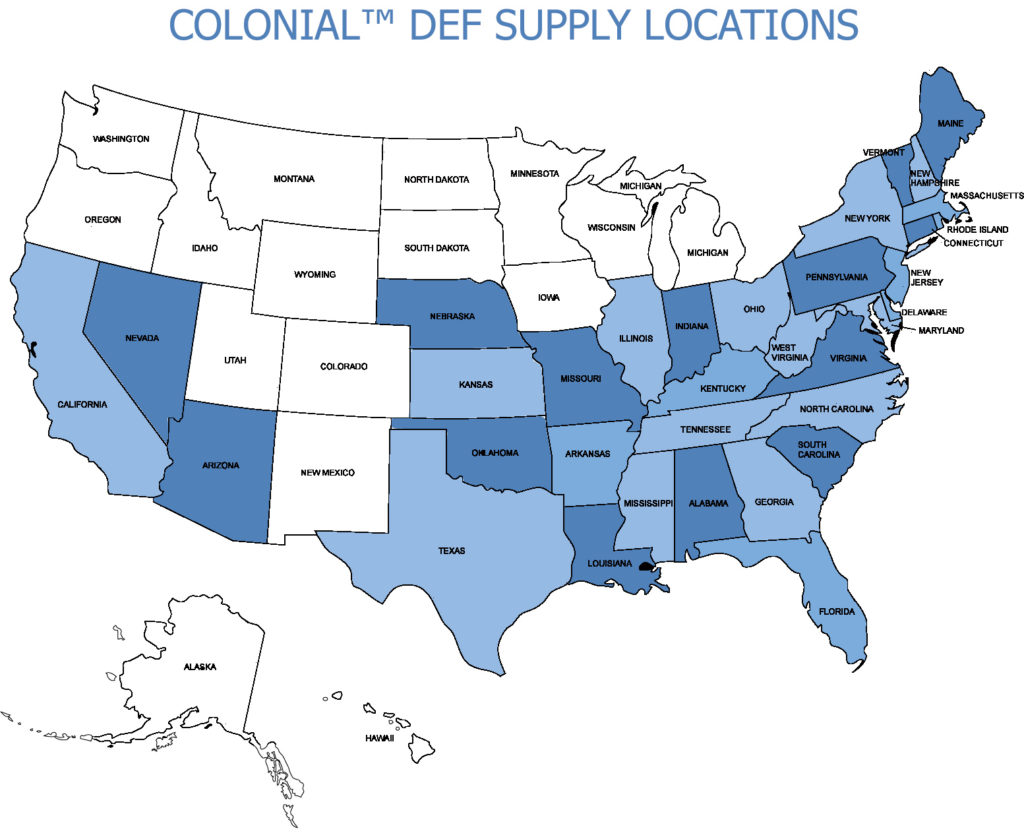
Packaging Options
Updating .pdf– Please check back soon.
Diesel Exhaust Fluid Facts
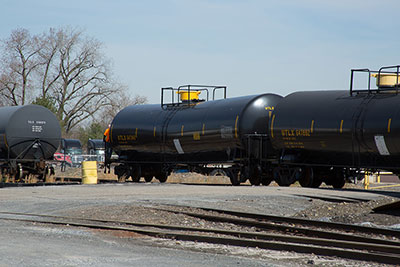 What is DEF and how should I use it?
What is DEF and how should I use it?
DEF is a high purity solution of urea in de-ionized water (32.5%). It is used to chemically reduce NOx emissions from vehicles powered by diesel engines. DEF is contained in a separate tank and sprayed into the exhaust gases. Never fill the diesel fuel tank with DEF.
How much DEF will I need?
Your DEF consumption will be approximately 2-6% of your diesel fuel consumption (approx 2-6 gallons for every 100 gallons of diesel used.) The newer model trucks will consume more DEF but offer better fuel mileage.
Is DEF harmful?
DEF is not harmful neither for humans or animals. DEF is not explosive and is non- toxic. If you get it on your skin or clothes, rinse with plenty of water.
Will DEF burn?
DEF does not burn and will not aid combustion
SCR Technology
What is SCR?
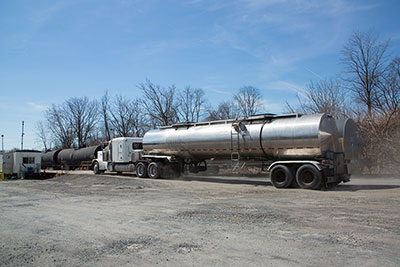 Selective Catalytic Reduction (SCR) is an innovative technology which leading North American manufacturers of diesel vehicles have jointly adopted after comparing and testing a variety of available technologies aimed at reducing NOx emission levels to the required limits. SCR is the only technology that produces the reduction of exhaust emissions required by legislation while allowing optimum engine operation in terms of performance and fuel consumption.
Selective Catalytic Reduction (SCR) is an innovative technology which leading North American manufacturers of diesel vehicles have jointly adopted after comparing and testing a variety of available technologies aimed at reducing NOx emission levels to the required limits. SCR is the only technology that produces the reduction of exhaust emissions required by legislation while allowing optimum engine operation in terms of performance and fuel consumption.
How does SCR work?
SCR technology reduces emissions of NOx gases that are produced inside the engine during combustion. This process requires the correct injected volume of DEF; a non-toxic, high quality, urea solution. DEF is sprayed into the hot exhaust gas stream just prior to the SCR unit and is then hydrolyzed to ammonia (NH3). Once inside the SCR unit, it assists in the breakdown of NOx to harmless Nitrogen gas (N2) and water (H2O).
| Tips on How to Use DEF | |
|---|---|
 Only fill DEF into the DEF tank. Look for the Blue Cap marked “DEF.” Only fill DEF into the DEF tank. Look for the Blue Cap marked “DEF.” |
 Do NOT fill DEF into the Diesel Fuel tank! Do NOT fill DEF into the Diesel Fuel tank! |
 Keep your DEF equipment clean and free from dust or dirt. Keep your DEF equipment clean and free from dust or dirt. |
 Do NOT fill Diesel Fuel into the DEF tank! Do NOT fill Diesel Fuel into the DEF tank! |
 Use dedicated equipment for DEF. Use dedicated equipment for DEF. |
 Never add tap water to the DEF or DEF tank Never add tap water to the DEF or DEF tank |
 You do not need to wear protective clothing while filling DEF. You do not need to wear protective clothing while filling DEF. |
 Avoid getting DEF on your clothes and skin. But if you do, it can easily be removed by using water. Avoid getting DEF on your clothes and skin. But if you do, it can easily be removed by using water. |
 If overheated, DEF containers can be chilled by standing in water. If overheated, DEF containers can be chilled by standing in water. |
 If spilled, wash with water, as the surface might get slippery. If spilled, wash with water, as the surface might get slippery. |
 DEF freezes at 12°F. DEF freezes at 12°F. |
 Do not use DEF when mixed with water or other substances, especially diesel fuel. Do not use DEF when mixed with water or other substances, especially diesel fuel. |
 Do not use DEF when mixed with water or other substances, especially diesel fuel. Do not use DEF when mixed with water or other substances, especially diesel fuel. |
 Never use shop equipment (containers, funnels, etc) that have been used with other materials. Never use shop equipment (containers, funnels, etc) that have been used with other materials. |
Frequently Asked Questions regarding DEF
- What is an SCR system and how does it work?
- What is the reducing agent used ? Where does it go in the vehicle?
- Why is it important that Diesel Exhaust Fluid be periodically replenished and how often does it have to be replenished?
- Where can consumers purchase Diesel Exhaust Fluid and how much will it cost?
- Are there any potential odors associated with Diesel Exhaust Fluid and what is recommended shelf life of the fluid?
- Are there any concerns about exposure to ammonia?
- Is the shelf life of Diesel Exhaust Fluid affected by Sunlight?
- Are there any corrosion issues related to materials?
- How should spills or leakages be handled?
- How would Diesel Exhaust Fluid interact with other vehicle fluids (e.g. windshield fluid, anti-freeze, oils, etc.?
- Would Diesel Exhaust Fluid corrode paint or surface finishings?
What is an SCR system and how does it work?
Selective Catalytic Reduction (SCR) is technology which when used in conjunction with a reductant (e.g. Ammonia) greater than 90% of NOX emissions can be converted safely to Nitrogen and Water.
What is the reducing agent used? Where does it go in the vehicle?
To mitigate the handling and safety concerns in using Ammonia on board moving vehicles 32.5% Urea Solution has been specified (Verband der Automobilindustrie e.V. or VDA DIN 70070 and ISO 22241) as the reductant precursor. USCAR has described the 32.5% Urea Solution meeting ISO 22241 standards as “Diesel Exhaust Fluid”. Diesel Exhaust Fluid is injected into the exhaust gas upstream of SCR catalyst and through hydrolysis decomposes to Ammonia and Carbon Dioxide.
Why is it important that Diesel Exhaust Fluid be periodically replenished and how often does it have to be replenished?
It’s necessary to replenish Diesel Exhaust Fluid periodically since it’s a consumable fluid used in proportion to the fuel (typically 2-3 % by volume). In smaller vehicles it is expected that replenishment will be synchronized with normal maintenance service intervals roughly every 6-12 months (e.g. oil changes). In larger trucks (Class 7 & 8 for example) DEF will be required about every 3000 vehicle miles or about every third fueling. It will depend on the size of the DEF tank on the vehicle.
Where can consumers purchase Diesel Exhaust Fluid and how much will it cost?.
Colonial Chemical focuses on selling Colonial™ DEF to fuel & lubricant distributors, the larger private and for hire fleets, truckstops, retail stores and the larger municipal & government fleets. Consumers will be able to purchase the fluid through their dealership networks and will likely be able to purchase the fluid through quick lube stations and selected retail outlets. Price will be determined by the market and by the dynamics of the Urea Industry but it’s expected that price will be comparable to diesel fuel prices. In conjunction with our partners we have sourcing solutions for all types and sizes of customers. Please contact us for more information.
Are there any potential odors associated with Diesel Exhaust Fluid and what is recommended shelf life of the fluid?
Urea solutions will hydrolyze and decompose to ammonia and carbon dioxide over time and temperature. Ammonia is detectable “typically by smell” above 25 ppm. It is recommended to keep packaged Diesel Exhaust Fluid in a temperate storage area (between –5oC and 30oC). Expected shelf life of the fluid under these storage conditions is 18 months.
Are there any concerns about exposure to ammonia?
Main concern would be if significant Hydrolysis has occurred generating sufficient ammonia vapor to impact worker safety (OSHA PEL is < 50 ppm and NIOSH IDLH is < 300 ppm for < 8 hours exposure)
Is the shelf life of Diesel Exhaust Fluid affected by Sunlight?
Urea is an excellent nutrient and will support organism growth. Prolonged direct exposure to sunlight should be avoided.
Are there any corrosion issues related to materials?
Main problems are with Non Ferrous Metals. Industry also notes that use of dissimilar metals (e.g. copper and aluminum) can result in “slime formation” which can clog fine nozzles (e.g. injection points). Most plastics are acceptable although teflon tape should not be used for metal fittings. Specific material compatibility can be found below.
How should spills or leakages be handled?
Absorb fluid with inert material such as sand or saw dust shovel into suitable container and dispose of in accordance with local regulations.
How would Diesel Exhaust Fluid interact with other vehicle fluids (e.g. windshield fluid, anti-freeze, oils, etc.?
Diesel Exhaust Fluid should not react with Windshield wiper fluids which are typically mixtures of ammonia and solvents (methanol) nor anti-freeze fluids (based on ethylene glycol). We would not expect chemical reactions would result from interactions with oils.
Would Diesel Exhaust Fluid corrode paint or surface finishings?
Definitive studies are ongoing but the corrosion characteristics should be similar to windshield wiper fluids which also contain ammonia.

